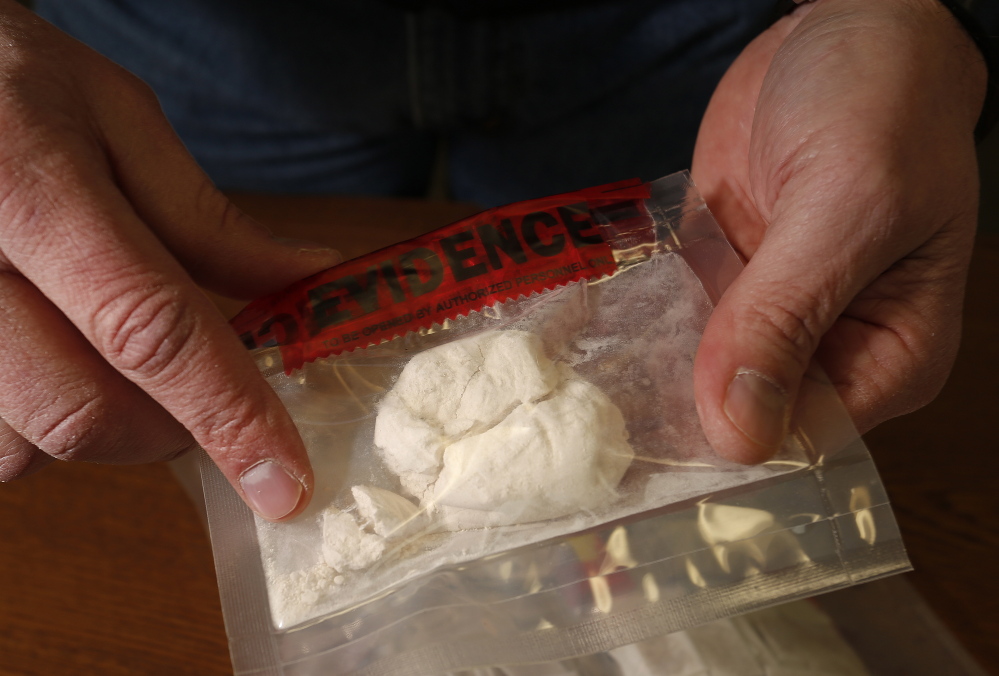Last year in Maine, 208 people died as a result of a drug overdose. If recent history is any indication, that number will be higher in 2015.
Yet in the way of public policy, very little is being done. Gov. LePage speaks frequently about the issue, but with the purpose of gaining more drug agents, prosecutors and judges. Drug treatment barely receives lip service, much less additional funding.
As an approach, that’s a loser, both politically at the State House, where Democrats justifiably are cool to his initiatives, and practically, as years of experience have shown drug addiction to be more of a public health issue than a law enforcement one.
For a more effective strategy, the governor should look south, to Massachusetts, where a fellow Republican, Gov. Charlie Baker, has launched an ambitious plan to combat opiate addiction.
SAME PROBLEM, DIFFERENT STATE
Massachusetts’ problem is remarkably similar to our own. The state had more than 1,000 deaths by drug overdose last year, a rate of about 1 for every 6,750 residents, only slightly lower than Maine’s.
In both cases, the problem intensified as people who had become addicted to prescription pain medications switched to heroin, cheaper and more readily available but less pure and more dangerous.
As in Maine, deaths from drug overdose have increased in Massachusetts each year over the last several. In response, Baker convened a task force on opiate use, with the goal of improving access to treatment and ending the stigma associated with addiction.
The result is a $27.8 million package in the budget, along with $6.7 million in additional funding.
BIPARTISAN INITIATIVE
The proposal includes money for higher rates of reimbursement for recovery houses, to move women civilly committed as a result of substance abuse from prison to treatment, and for school programs about the danger of opiates.
The funding also will create a database for treatment options, allow for better prescription monitoring and help enforce laws related to overprescription and the improper procedures at treatment facilities. There will be a new emphasis on fostering partnerships between correctional facilities and health centers, so that inmates receive treatment.
Finally, it creates a new assistant secretary to the commissioner of health and human services to oversee the implementation of the plan.
Together, the initiatives hit the complex problem of substance abuse from a number of different angles, cutting back on the amount of pain medications available to start addictions and making sure there are treatment beds on hand when addiction takes hold.
Just as important, the plan – and its focus on getting addicts into treatment – has the full support of the state’s chief executive, whose public statements back up that policy and set the tone for its implementation.
MISPLACED PRIORITIES
Contrast that with Maine, where Gov. LePage’s call for more drug enforcement last year was scaled back and altered by lawmakers to include treatment, then shelved because of lack of funding. A similar, small-scale initiative was included in the budget passed last week.
This strategy is getting the state nowhere at a time when opiate addiction is at an all-time high and rising.
It has left the state in a spot where it spends a lot of money on drug and alcohol abuse, just mostly in the wrong spots.
Maine spends hundreds of millions on the policing, prosecution and incarceration of drug abusers, and tens of millions more of public health funds to deliver drug-dependent babies, but we spend a relatively small amount on the treatment beds and programs that could make much of that spending unnecessary.
LePage won’t listen to the Democrats as they propose a more balanced approach to drug addiction, one that treats it as a chronic illness and that doesn’t rehash the failed policies of the War on Drugs. But maybe he’ll listen to Baker.
“The solution to eradicating opioids is not a one-size-fits-all approach,” the governor of Massachusetts said last month, “and will require all of us to rethink the way we treat addiction.”
Send questions/comments to the editors.



Success. Please wait for the page to reload. If the page does not reload within 5 seconds, please refresh the page.
Enter your email and password to access comments.
Hi, to comment on stories you must . This profile is in addition to your subscription and website login.
Already have a commenting profile? .
Invalid username/password.
Please check your email to confirm and complete your registration.
Only subscribers are eligible to post comments. Please subscribe or login first for digital access. Here’s why.
Use the form below to reset your password. When you've submitted your account email, we will send an email with a reset code.